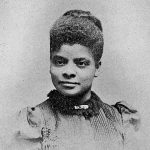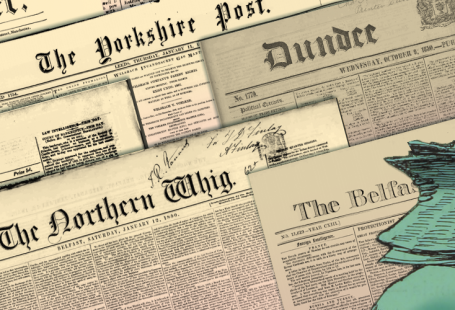This week at The Archive we have added a total of 75,958 brand new pages to our collection, and we are delighted to announce the addition of two brand new titles, covering the headlines between 1805 and 1961.
So read on to discover more about our two new titles of the week, from an early Sunday newspaper to a Reading newspaper with a variety of political alliances. We will also be looking at the FA Cup Final 120 years ago, when Sheffield United took on Tottenham Hotspur for the prestigious title.
Register now and explore the Archive
First appearing on 19 May 1805, The News (London) was published ‘at an early hour every Sunday Morning’ at the News Office, Burgess Street, London, and was ‘distributed throughout the metropolis.’
It was on the 19 May 1805 that the ‘Proprietors of The News‘ entered into a ‘fair and honourable competition with the other Weekly Papers.’ But what could you expect to find within its pages? A comprehensive publication, The News (London) featured news from abroad in columns like ‘European Politics’ and ‘Foreign Intelligence,’ as well as from closer to home, with the latest from the House of Commons. For example, the first edition contains a long piece on Catholic Emancipation, which was being discussed by parliament at the time.
The News (London) | 27 June 1830
The News (London) was certainly wide-ranging in its scope, also featuring the latest law and police news, reports of bankruptcies and accidents, as well as marriages and deaths. On the lighter side, you will find within its pages the latest from London’s theatres, as well as ‘Court and Fashionable’ intelligence.
Moving on to our next new title of the week, the Reading Standard. Initially published in Newbury as the Newbury Express and Reading Standard by William Hall, the Reading Standard began life as a Conservative newspaper, or indeed ‘An Official Conservative Organ for Reading, Wokingham and Berkshire.’
In approximately June 1886 this title was renamed the Reading Standard, whilst in 1890 publisher William Hall faced a set back. He was disallowed from printing at night, possibly as he had been disturbing his neighbours, and so he moved the printing operation from Newbury to Reading. This move was a profitable one; Reading having a much larger population than Newbury, and so the newspaper necessarily became more Reading focused.
In the pages of the Reading Standard you could expect to find a women’s fashion column, a gardening column, society gossip, fiction (both short stories and longer serialized ones), as well as illustrations. Indeed, it even had a reputation for its advertisements being ‘more typographically pleasing than those appearing in rival papers.’
Reading Standard | 9 January 1891
In 1897 the Reading Standard shifted its political allegiance to become politically independent, becoming the ‘Independent and Progressive Newspaper for Reading and District.’ It set out its stall to become an ‘interesting Family Paper,’ and began to regularly feature photographs within its pages.
Meanwhile, in 1902 the paper again made a political U-turn, becoming this time a Liberal newspaper. It promised to advocate ‘a True Liberal Policy in things Political, Educational, Religious, and Municipal.’ It now termed itself as ‘The Liberal and Progressive Newspaper for Reading and District.’
Reading Standard | 22 January 1910
By 1913 the Reading Standard claimed to be ‘the premier newspaper for the Town and County,’ and not only that, the ‘finest pennyworth for quality and quantity of provincial journalists.’ At this point in time, the Reading Standard asserted that it had a circulation of 50,000.
A weekly newspaper, the Reading Standard appeared every Friday, and by 1960 it filled 28 pages and cost three pence.
Meanwhile, we have made exciting additions this week to our existing titles. We have added new pages to the Wolverhampton Express and Star, which was established as a Liberal publication in 1880. Bought by wealthy Scottish-American philanthropist Andrew Carnegie in 1882, and run by his friend Thomas Graham, the Wolverhampton Express and Star saw success after success.
Still published to this day, the Wolverhampton Express and Star remained in the Graham family and maintains strong ties to association football, featuring local and national news. In 2007 the newspaper had an estimated circulation of 170,000.
Other updated newspapers of the week include Dorset titles the Blandford Weekly News and the Weymouth Telegram, as well as the Stoke-based Potteries Examiner.
A Year Ending in One – Spurs Win the FA Cup for the First Time
In April 1901 Sheffield United took on Tottenham Hotspur in the FA Cup Final. Our new and updated newspapers give us a wonderful insight into the anticipation surrounding the game, which saw non-league Spurs take on the Blades.
The Reading Standard describes how, on 20 April 1901:
It is estimated that at least 100,000 persons will flock to the Crystal Palace to-day (Saturday) in order to witness the final tie for the Football Association Cup between Tottenham Hotspur and Sheffield United. Every arrangement has been made for the comfort and convenience of a very large crowd.
The Crystal Palace Stadium contained 12,000 seats ‘from which the match may be viewed,’ with seats costing ‘from half a crown to a guinea.’
The crowd at Crystal Palace | Illustrated London News | 27 April 1901
The Reading Standard outlines its concern for the capital’s infrastructure, with the anticipation of such large crowds descending upon South London:
On a rough calculation no fewer than forty special trains will bring something like 30,000 persons to town from Sheffield and the surrounding districts. How this mass of humanity is to be carried across London and deposited at the gates of the Palace is hard to tell. One thing is certain – the resources of our slow but sure railways are certain to be taxed to the utmost.
Meanwhile, the players had been ‘reposing peacefully at their training quarters:’ the Sheffield United team at Skegness, and Tottenham Hotspur at Chingford. The Reading Standard goes on to note how ‘It will be a great day for London should Tottenham Hotpsur win.’
Action from the game | Illustrated Sporting and Dramatic News | 27 April 1901
But it was not to be. The game ended in a draw, and was to be replayed on the following Saturday, 27 April 1901. New pages added to the Wolverhampton Express and Star reveal how this replay was not without controversy, as objections were made as to the suitability of the ground where the match was to be played:
The game was played at Burnden Park, Bolton, a most unsuitable enclosure for such a match by reason of the smallness of its accommodation and the narrowness of its approach. Burnden Park, at a pinch, will hold only 35,000 people, so that it was far too small for an English Cup Final attendance, and particularly when it is remembered that Sheffield is comparatively near Bolton.
‘Both clubs protested against the match taking place on this enclosure,’ but the protests fell on deaf ears and the game went ahead regardless. The Wolverhampton Express and Star observes that the teams should still be happy, the successful FA Cup campaign having netted Sheffield United £2,140 (just under £190,000 today) and Tottenham Hotspur £1,939 (just over £150,000 today).
Kick off at Crystal Palace | Illustrated London News |
But how was the match to pan out? The Wolverhampton Express and Star notes how the Blades found ‘Spurs to be a surprisingly speedy and dashing eleven’ in their previous encounter, noting how ‘the thousands of Yorkshiremen who went to the Palace returned home with an enhanced opinion of the upholders of Southern football.’
These same Yorkshiremen, however, were destined this time to go home disappointed. Despite Sheffield United leading 1-0 at half time, the Birmingham Daily Gazette describes how in ‘the second half Cameron, Smith and Brown scored for Tottenham,’ meaning that the non-league side had defeated their league rivals 3-1, in front of a crowd of ‘21,000 spectators.’
The two teams | The Sportsman | 20 April 1901
Unsurprisingly, the winning Spurs team was greeted with adulation upon their return to North London in the early hours of Sunday morning. The Birmingham Daily Gazette describes how:
The team reached South Tottenham Station shortly before one o’clock, and met with a tremendous ovation from the crowd, which was estimated at from 20 to 30 thousand. The players entered a wagonette and drove to the clubhouse to the accompaniment of music from two bands and deafening cheers from the public.
The winning Spurs team | Illustrated Sporting and Dramatic News | 4 May 1901
The same newspaper goes on to describe the joyous procession:
Jones, the captain of the team, held aloft the Cup, which was decked with the colours of the ‘Spurs. The streets were gaily decorated with flags and lanterns, and numbers of torches were borne by the people, who marched in procession behind the triumphal car. The journey to the clubhouse, a distance of a mile and a half, occupied over an hour, so great was the throng.
Spurs had won the FA Cup, and would go on to win it seven more times. Their success famously coincides with years ending in one; the club having won the title in 1921, 1961, 1981 and 1991 respectively. Unfortunately for Spurs fans, 2021 is not destined to be another FA Cup winning year for the North London side!
New Titles
Title |
Years Added |
| Reading Standard | 1891-1895, 1897-1911, 1913-1961 |
| The News (London) | 1805, 1807, 1809-1835 |
Updated Titles
This week we have updated seven of our existing titles.
You can learn more about each of the titles we add to every week by clicking on their names. On each paper’s title page, you can read a FREE sample issue, learn more about our current holdings, and our plans for digitisation.
| Title | Years Added |
| Blandford Weekly News | 1891 |
| Potteries Examiner | 1880 |
| St. Helens Examiner | 1898 |
| Warrington Examiner | 1880 |
| Weymouth Telegram | 1894 |
| Widnes Examiner | 1880, 1897, 1911 |
| Wolverhampton Express and Star | 1898, 1901, 1905, 1909-1910, 1912 |
You can keep up to date with all the latest additions by visiting the recently added page. You can even look ahead to see what we’re going to add tomorrow.















